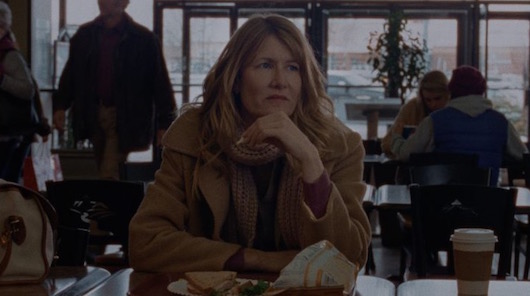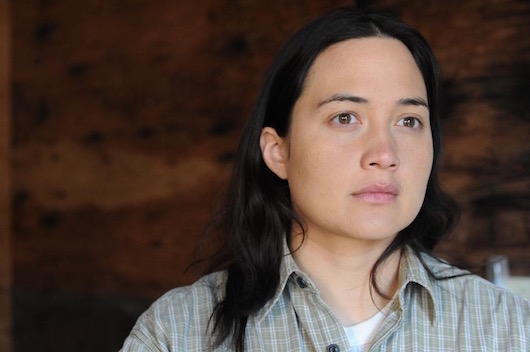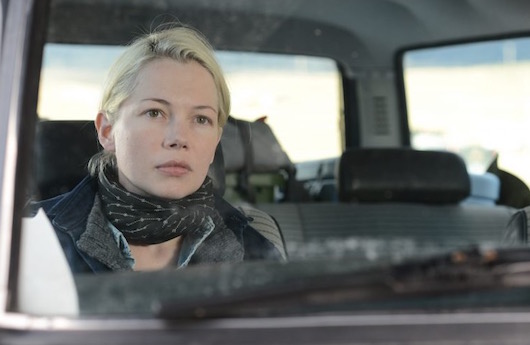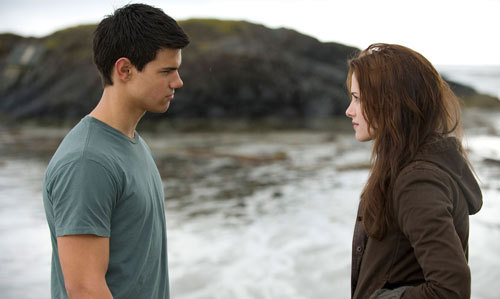
The Once and Future Fairytale
by SHAHIRAH MAJUMDAR
There are those of us who are too stiff-fingered, too hardened by our many years around the merry-go-round to feel the tug of Stephenie Meyer's Twilight Saga. As stories go, this is one that's come around many times before.
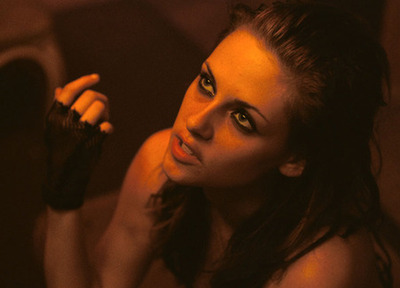
We all know the gist by now: first love; a lion and a lamb; star-crossed lovers; suffering and redemption; a life given meaning by the presence of the other. Twilight tacks on vampires, a YA label, and a happy ending? just enough to make this book appropriate for the younger set. It also gives us a boy and a girl so consumed by their love for another that they are willing to endure any sacrifice, any indignity, any bodily pain or mental anguish for the sake of the other's happiness. For Bella and Edward, the complete erasure of the self would not to be too great a sacrifice to express the totality of their devotion. The Story of O doesn't have much on the Twilight Saga. On the other hand, Jesus might.
A couple of nights after New Moon was released, I gave into the onslaught: to Caitlin Flanagan's piece in The Atlantic, to my married cousin's A++ reviews, to K-Stew and R-Pattz with his sanpaku eyes. I read all four books in one stretch and I dreamt hazy dreams which, unlike Bella, I can't remember, but, like Bella, I awoke disturbed, conscious of things unsettled inside of me: subdued desires, long-resigned ideals.

It's pure fantasy, of course, pure revisionist nostalgia, unrealistic not because of its vampires and werewolves, but because of the way it limns that old story, the first fairy tale: that love is the whole history of a woman's life. To enter into the Twilight world is to slip into a lost continent, a Gondwanaland of the hormones that existed for a brief moment before the violence of experience tore everything apart. There is no shading here, neither in the book's thematic treatment nor in the extraordinary literalness of the writing itself. Light pools. Shadows bloom. Skin is either winter cold or burning hot. The story unwinds like the pet fantasy of teenage girl, lingering on every thought and touch and observation. No action is presented without being analyzed. No misunderstanding is cleared up if it can be dragged on for a hundred pages. And, if that misunderstanding is nearly fatal, if Bella can be pushed to the brink of destruction, and Edward can be left hating himself for bringing her so far, so much the better. The resolution is that much sweeter. The "torture the woman" school of storytelling has never gone out of style.

Despite all the atmospheric gloom, this is a universe of blinding emotional and moral clarity. Twilight is no noir; it's a nighttime soap opera in high key lighting. For Bella, Edward and beleaguered best friend Jacob, love is the light that illuminates everything. Pain is the result of confusion, of trying to force things together that don't fit, or of trying to keep things apart that are meant to be together. And the ultimate lesson Twilight offers, the notion that hooks so many starry-eyed girls, is that love will never betray you. That is: The boy will always come back to you. The best friend will be there for you. Even your parents, however much they question your decisions, will melt in the face of any prospective unhappiness and ultimately support you.
The lesson of modern life, in contrast, is rather the opposite. In life as I know it, among all the savvy boys and girls gliding in dark jeans down the Bowery, it's simply not safe to feel the way Bella feels about Edward. We were seventeen once, but now we know better. After years of dating, of crashing in and out of love, of the resulting flattening of the soul, the damaged ego, the imagined humiliations most of us have learned that it is prudent to set the dial low. To love that much, to have one's happiness revolve so completely around another person, is a recipe for disaster. To love someone that much is to give them the power to hurt you, and which one of us wants to go through all of that again?
And yet, I awoke one morning after consuming some 2400 pages of emotional pornography and wondered at the cost of a highly developed instinct for self-preservation. It's that instinct that separates Bella from me: there's a lot I wouldn't do for love; there' nothing Bella wouldn't. Ever the intrepid heroine, neither college, nor career, nor villainous vampires and nor a rib-shattering Rosemary's baby can swerve her from her single-minded devotion. For the millions of Twilight fans, Bella's is an ideal worth emulating. For the pink-sweatered kids among them, well, life hasn't taught them any better yet. As for the others, the mothers and the grandmothers and the young marrieds like my cousin, there somehow still exists a secret self, one that doesn't belong to the drudgery of car pools or cubicles or two-for-one supermarket specials; a secret self that swells in the night, pleasuring itself with dreams of fevered romanticism.

That secret self doesn't question Bella's sanity when she announces that Edward loves her unconditionally and irrevocably and, to be honest, irrationally. It doesn't find Edward's beauty (bronze haired, angel-like, sparkly in the sunlight) as cheap as a Chinatown trinket. Nor does it wince at the lengthy arguments about who loves the other better, nor cringe at the words forever, soul mate and lines in the tenor of eyes like stars or meteors in a moonless sky. As the sold out midnight screenings across America testify, this is a secret self that still knows how to swoon.
The experts say that Bella is a terrible role model, and I daresay they are right. But what they seem to assume is that weaning a girl on feminist approved YA books will set her course straight for life which is not unlike saying that a kid raised on a sugar free diet will always win a battle with an ice cream sundae. As any girl who loved Talking to Dragons as well as Wuthering Heights and still ended up betting it all on the love the first time and maybe even the second time can attest, it's only experience that can work that kind of magic. It takes a broken heart to make lessons about not falling for the wrong kind of guy stick. And then, chastened, wary, more certain of ourselves, instead of mooning over prom dates and first kisses, we learn to focus our energy on work and career, on engaging with the outside world and shaping it in ways we can control. We think in terms of realpolitik. We separate sex from romance. We learn to self-actualize. Some of us do yoga. Some of us are man-eaters. Some of us are in relationships with a good enough kind of guy.

Most of all, we resign ourselves to the knowledge that - irrevocably, unconditionally, irrationally - is only for the crazies. After a while, we forget what it felt like to even harbor that craving. I loved my last boyfriend, though never in the swooning sort of way, and we spent two years together until I decided to take an extended trip outside of the States. I said we'll take a break but then I never came back. This was easy because I never expected us to do anything but fail in the long run; my running out on him was just an accelerated means to an already foregone conclusion.
It is a sign of my apathy that I regard my own romantic history with a certain amount of cynicism. This is in contrast to Bella who catalogs every moment of Edward's courtship and charges them with torrid and terrible portent. I could tell you about my first love (he changed his name after we broke up; I dropped out of school) or my second love (he said, "I can't do this anymore, I need to focus on my art"; I felt my entire existence had been negated) but it's hard to muster the enthusiasm to go beyond the barest details. Somewhere along the way, maybe around the time my best friend called me after watching Vicky Cristina Barcelona to inform me that I was definitely Cristina, or the summer all four of my siblings stayed with me and my boyfriend in our loft on Varick Street and each of them told me separately that they couldn't stand him, or maybe it was just after I quit my last job and realized that I was broke and we weren't in love and that maybe I'd never write a damn thing worth publishing - it occurred to me that love wasn't the most important thing to me after all.

Do you ever really recover from heartbreak? Bella is never unlucky to have to find out. What I know is that the boy from whom you were once inseparable will indeed move on from you, and sometimes good friends, great friends, will disappear so deep into their own drama that they are no longer capable of being there for you. The world spins on. You soldier on. And if you can hold on to your secret, swooning, sweatered self while you do, then so much the better for you. It's not such a terrible thing to wish for Bella's innocence. There are far worse things to face in the daylight.
Shahirah Majumdar is a contributor to This Recording. You can find her website here.
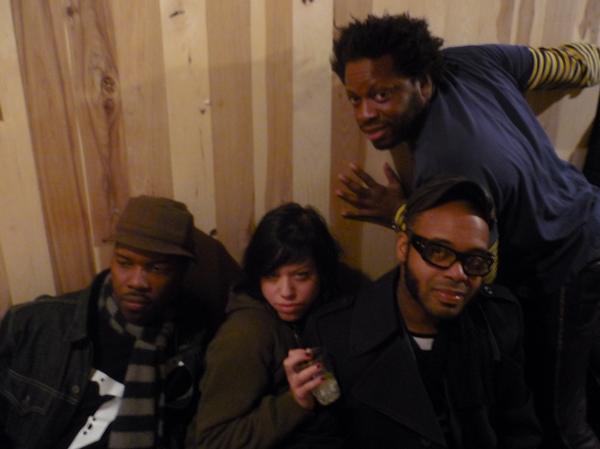
"Everlasting Gobstopper" - Apollo Heights (mp3)
"Disco Lights" - Apollo Heights (mp3)
"Black and Blue" - Apollo Heights (mp3)
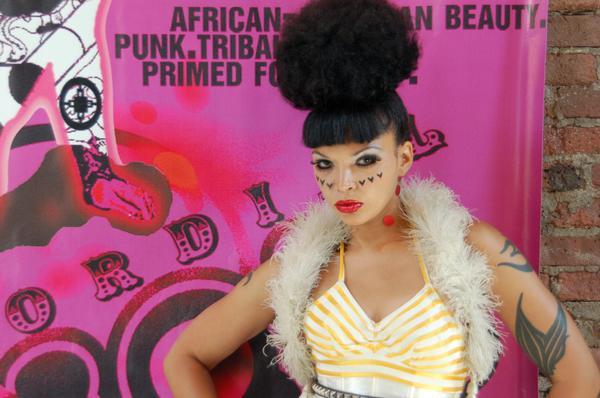
 FILM
FILM  Friday, October 7, 2016 at 10:52AM
Friday, October 7, 2016 at 10:52AM 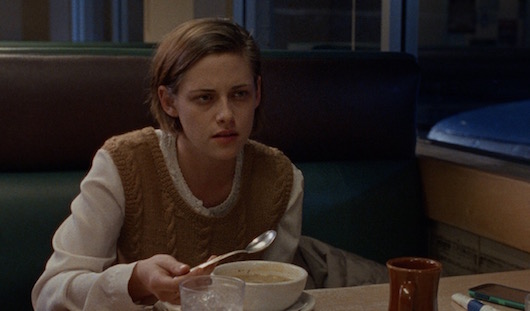
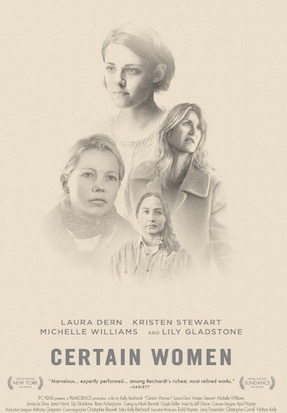 The setting for the new film by Kelly Reichardt (Night Moves) is rural Montana. The landscape in this place explodes with color along a narrow scale. Darkness is almost complete, but there is never any morning – just a freezing day that plops down without warning. There is no music in Certain Women until about ten minutes before the movie ends, when it seems like the farmhand played by Lily Gladstone is on the verge of potentially displaying an emotion. She never does.
The setting for the new film by Kelly Reichardt (Night Moves) is rural Montana. The landscape in this place explodes with color along a narrow scale. Darkness is almost complete, but there is never any morning – just a freezing day that plops down without warning. There is no music in Certain Women until about ten minutes before the movie ends, when it seems like the farmhand played by Lily Gladstone is on the verge of potentially displaying an emotion. She never does.